初中英语时态全解
图片预览
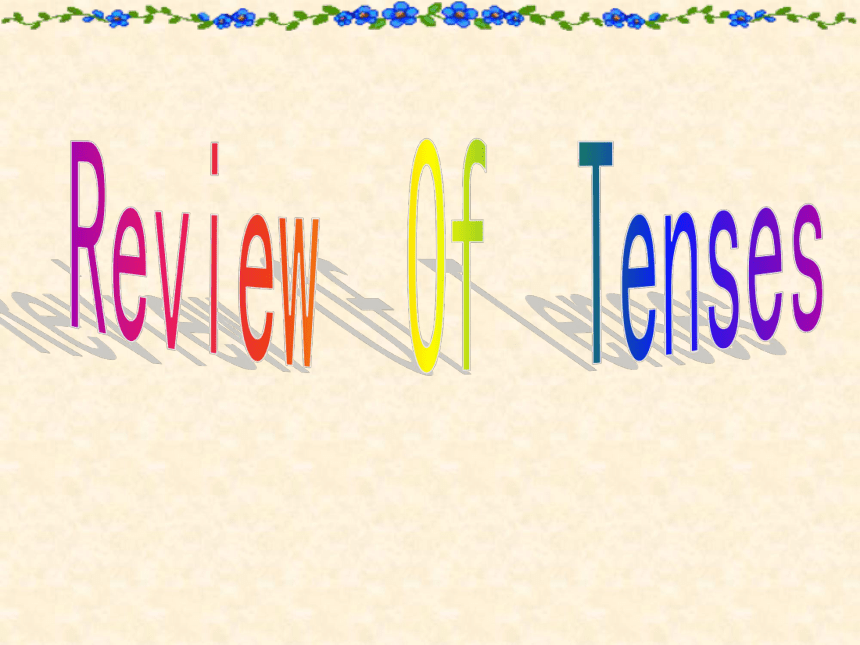
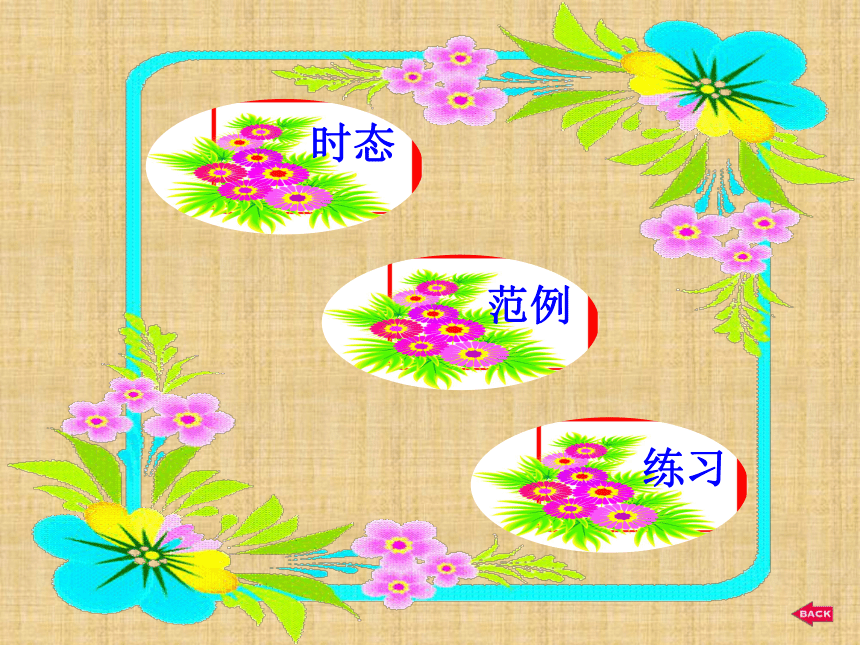
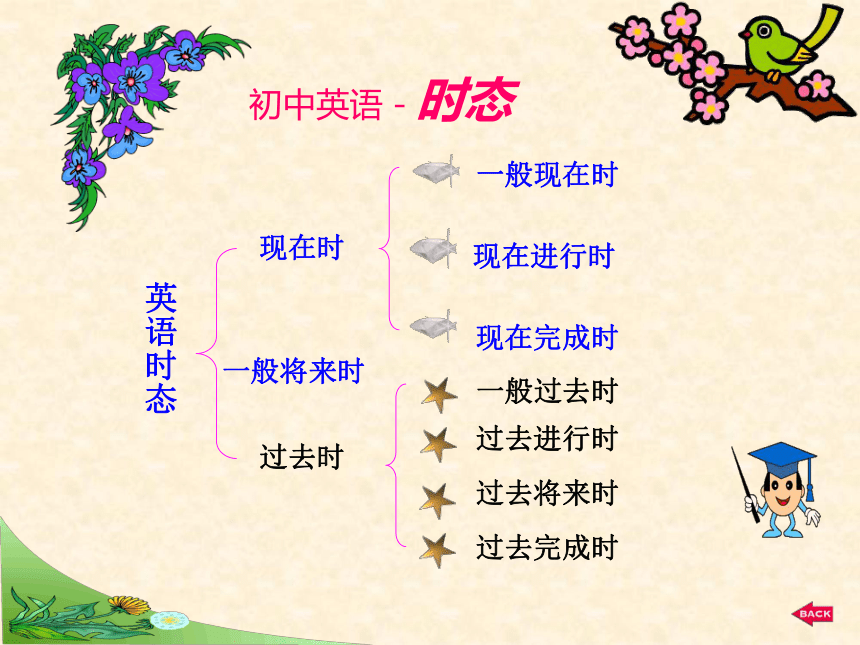
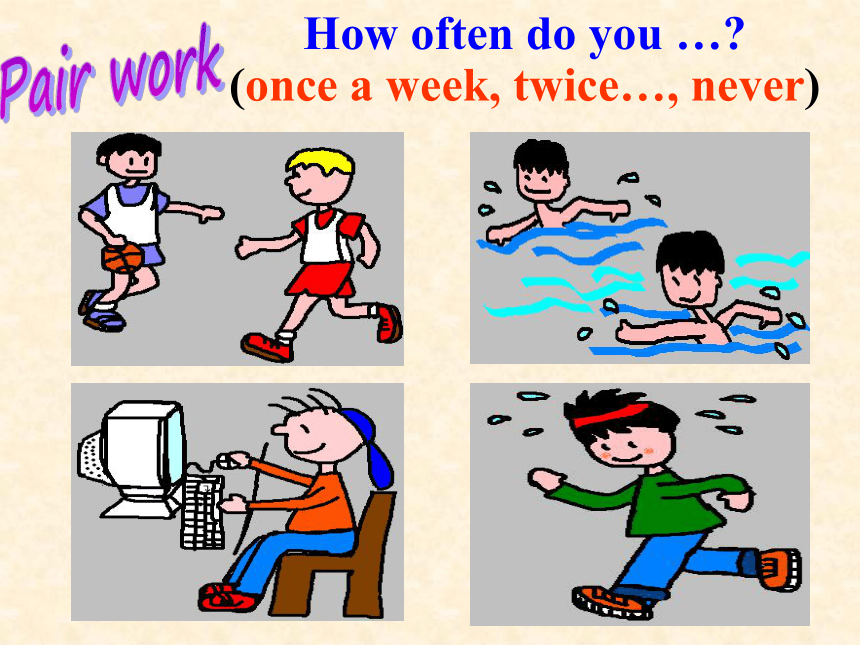
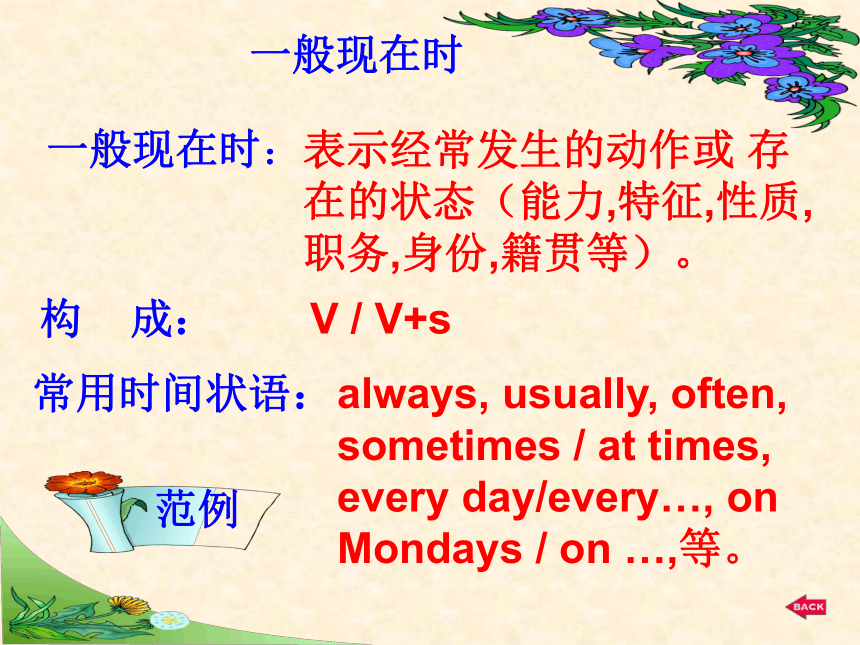
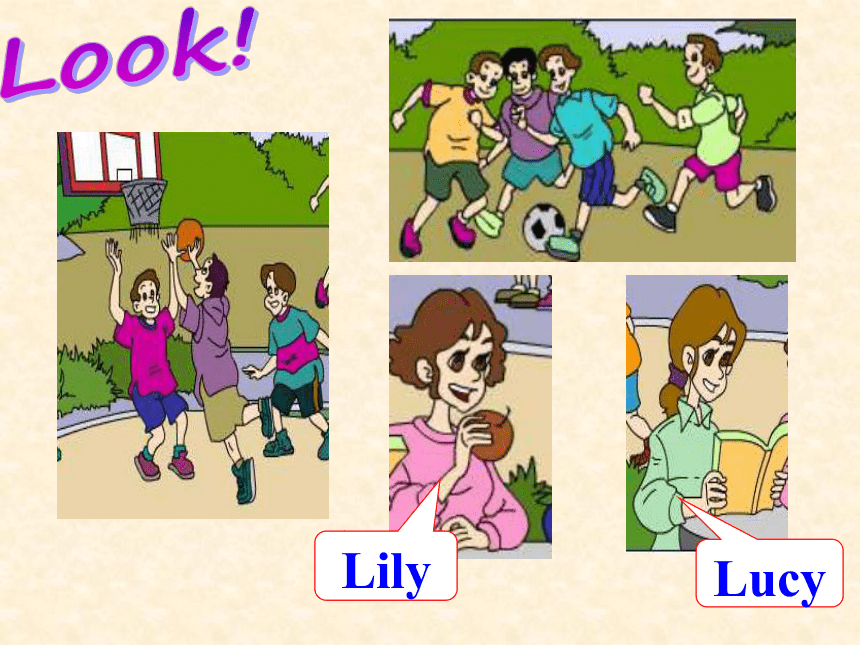
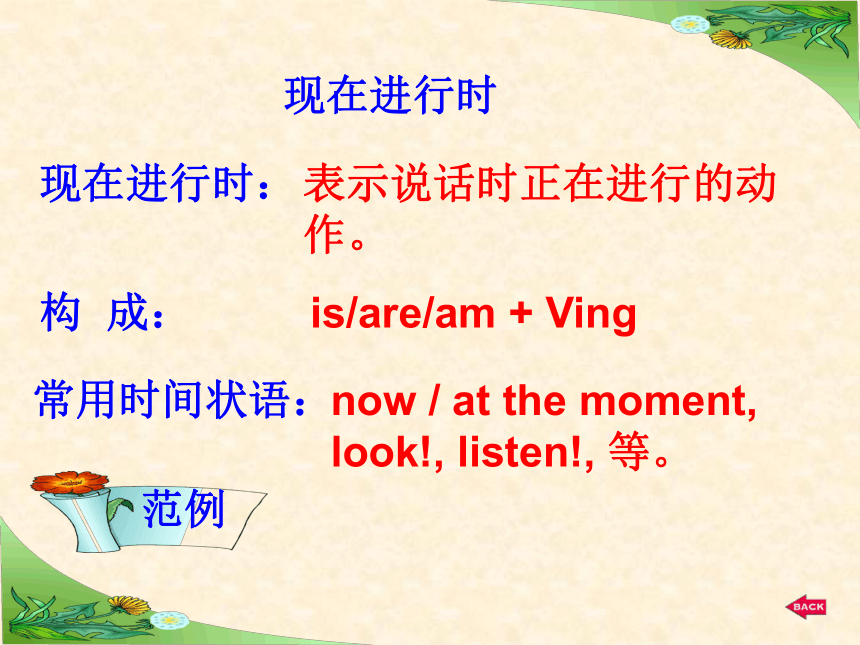
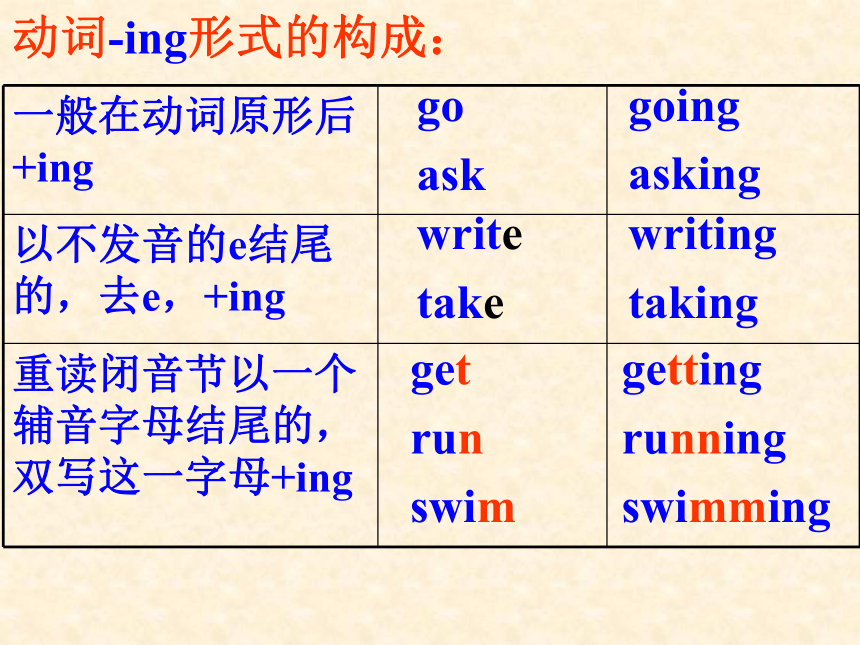
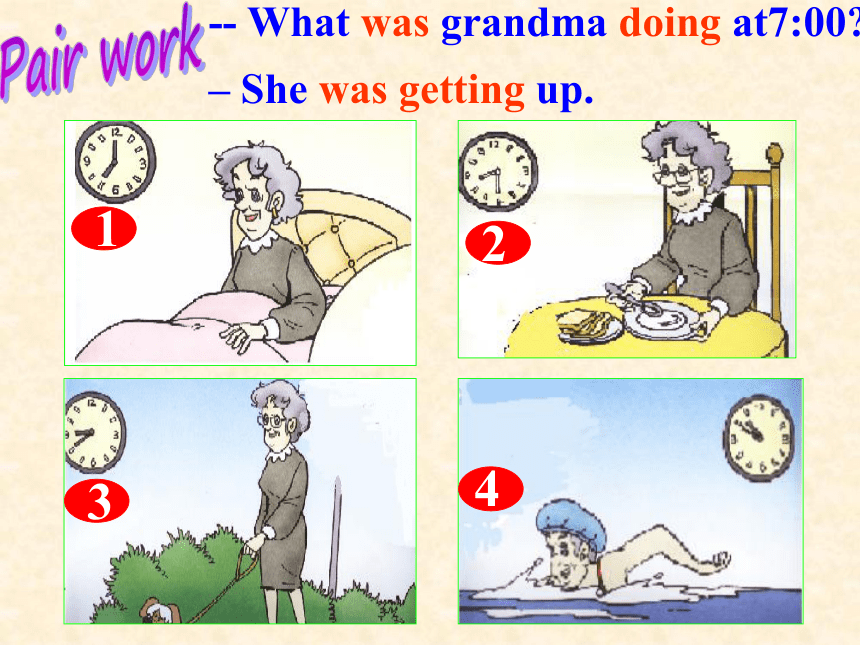
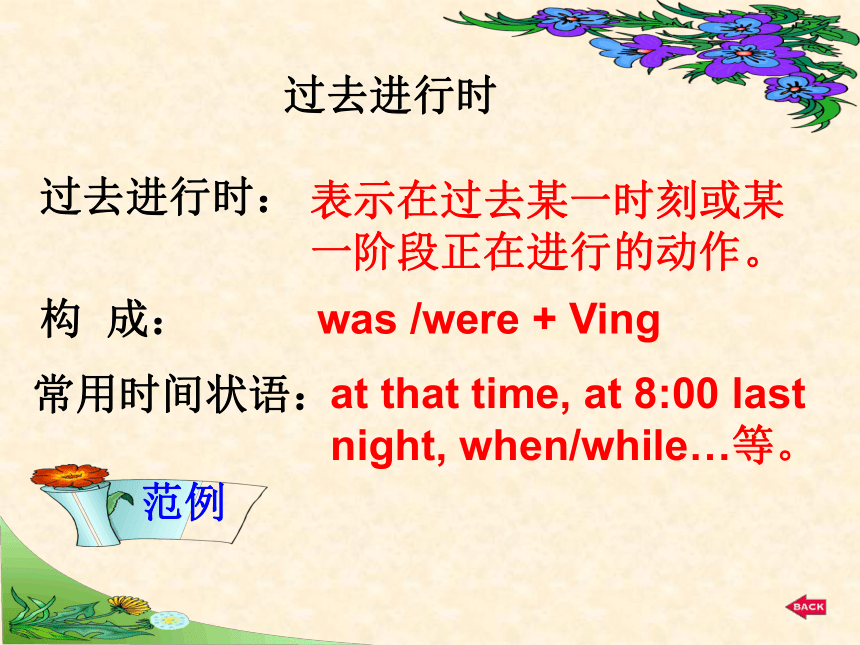
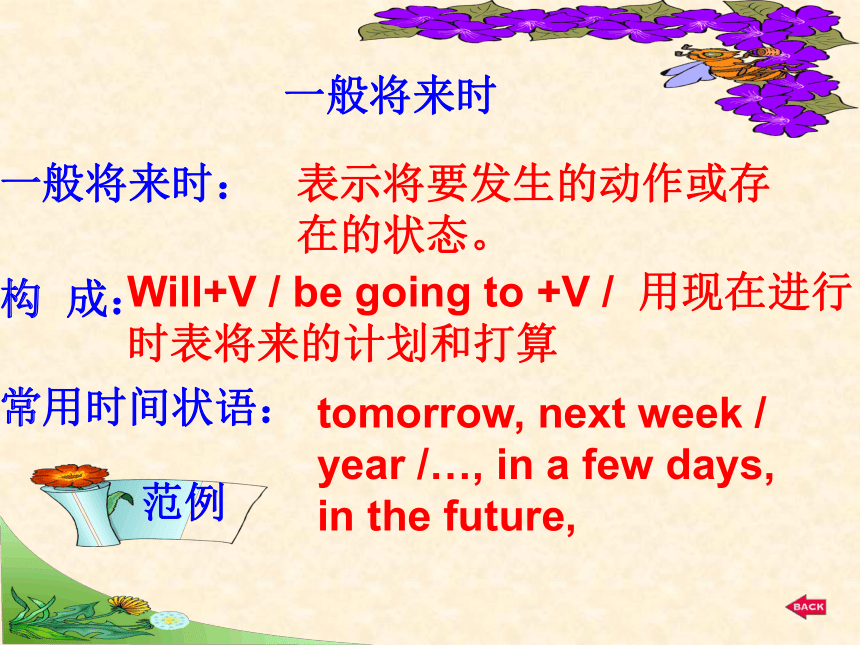
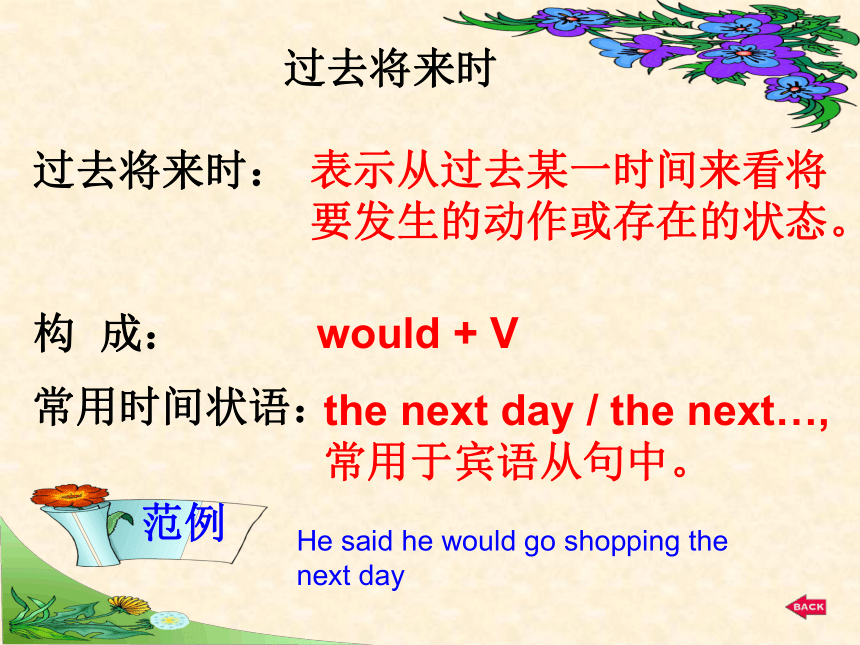
文档简介
(共63张PPT)
时态
范例
练习
初中英语-时态
英语时态
一般过去时
过去进行时
过去将来时
过去完成时
一般现在时
现在进行时
一般将来时
现在完成时
现在时
过去时
How often do you …
(once a week, twice…, never)
一般现在时
一般现在时:
构 成:
常用时间状语:
V / V+s
表示经常发生的动作或 存 在的状态(能力,特征,性质,职务,身份,籍贯等)。
always, usually, often, sometimes / at times, every day/every…, on Mondays / on …,等。
范例
Lily
Lucy
现在进行时
现在进行时:
构 成:
常用时间状语:
is/are/am + Ving
表示说话时正在进行的动作。
now / at the moment, look!, listen!, 等。
范例
一般在动词原形后+ing
以不发音的e结尾的,去e,+ing
重读闭音节以一个辅音字母结尾的,双写这一字母+ing
动词-ing形式的构成:
writing
taking
getting
running
swimming
going
go
ask
write
take
get
run
swim
asking
1
2
3
4
-- What was grandma doing at7:00
– She was getting up.
过去进行时
过去进行时:
构 成:
常用时间状语:
was /were + Ving
表示在过去某一时刻或某一阶段正在进行的动作。
at that time, at 8:00 last night, when/while…等。
范例
tomorrow, next week / year /…, in a few days, in the future,
一般将来时
一般将来时:
构 成:
常用时间状语:
Will+V / be going to +V / 用现在进行时表将来的计划和打算
表示将要发生的动作或存在的状态。
范例
过去将来时
过去将来时:
构 成:
常用时间状语:
would + V
表示从过去某一时间来看将要发生的动作或存在的状态。
the next day / the next…, 常用于宾语从句中。
范例
He said he would go shopping the next day
-- When did you get up
-- I got up at …
get up got 6:00
go to school went
have lunch had 12:00
play basketball played
do homework did
go to bed went
一般过去时
一般过去时:
构 成:
常用时间状语:
V+ed
表示在过去某一时间内发生的动作或存在的状态。
yesterday, last week / last…, an hour ago / …ago, just now, in 1962/…等。
范例
动词-ed形式的构成:
在动词后加-ed
以字母e 结尾的动词,只+d
“ 辅音字母+y ” ,变y 为i, 再+ed
重读闭音节以一个辅音字母结尾的,双写+ed
want
answer
move
die
carry
cry
stop
plan
wanted
moved
died
carried
cried
stopped
planned
answered
got
drank
took
went
swam
ate
cut
were
had
did
came
said
saw
put
get take
go swim
eat drink
are have
do come
cut put
say see
现在完成时
现在完成时:
构 成:
常用时间状语:
have / has +Ved
表示过去发生的某一动作对现在造成的影响或结果。
already / yet, just, ever / never, since…, for two days, in the past three years, so far, before,
范例
get
go
eat
are
do
cut
say
got gotten
went gone
ate eaten
cut cut
were been
did done
said said
take
swim
drink
have
come
put
see
took taken
swam swum
drank drunk
put put
had had
came come
saw seen
现在完成时与一般过去时容易混淆,就是因为它们所表示的动作都发生在过去,但二者又有区别:一般过去时表示过去某个时间发生的事、存在的状态或经常发生的动作,说话的侧重点在于陈述一件过去的事情,与现在没有关系;现在完成时表示与现在有关系的发生在过去的动作,它不与表示过去的时间状语(如yesterday , last week , a moment ago ,in 1990等)连用
如: I have seen the film.我看过这部电影。(我已经了解这部电影的内容)
I saw the film last week.我上星期看了这部电影。(只说明上星期看了这部电影,不涉及现在的情况.)
He has lived here since 1992.自1992年以来他一直住在这里。(他现在还住在这里。)
He lived here in 1992.在1992年他住在这里。 (不涉及现在他是否还住在这里。)
“have/has gone to + 地点”表示“某人去了某地(还未回来)”,指主语所指的人不在这儿。
“have/has been in + 地点”表示“在某地呆了多长时间”,常与表示时间的状语连用。
“have/has been to +地点”表示“曾经去过某地(但现在已不在那儿)。”
如: She isn’t at home, She has gone to Beijing
She has been in Beijing for a week.
She has been to Biejing twice.
过去完成时
过去完成时:
构 成:
常用时间状语:
had +Ved
表示在过去某一时刻或动作以前已经完成了的动作。比如说,A事件发生在一个月前,而B事件发生两个月前,那么B事件比A事件还要早发生,B就要使用过去完成时
by the end of…, by the time…, when…, before, after…, 等。
范例
The bus had left by the time he got outside.
一般过去时和过去完成时用法有哪些不同? 1. 在主从复合句中的用法不同 (1) 用在宾语从句中 在主句谓语为一般过去时的宾语从句中,既可用一般过去时,也可用过去完成时。但两种时态的意义明显不同。试比较下列两组句子: She said she was a doctor. 她说她是位医生。(说话时仍为医生) She said she had been a doctor.她说她曾当过医生。(说话时已不是) She said she had been a doctor for twenty years.她说她当过20年的医生。(主要强调说话时已当过20年医生,此状态可能已经结束,也可能还没有) 但是,如果从句中有表示具体时间的状语,则常用一般过去时。例如: He said he was born in 1986. 他说他是 1986年出生的。
( 2) 用在含有when的主从复合句中 由于when本身不能明确表示时间的先后关系,故先发生的动作应用过去完成时,后发生的动作只需用一般过去时。这样用过去完成时的可能是主句,也可能是从句。例如: When all his money had been used up, Peter had to turn to a friend for help. 当他的钱全都用光时,彼得只好转而求助于一个朋友。 有时,主句和从句的谓语动词的先后关系不十分明确,两个动作紧接着发生,前一动作导致后一动作,这时两者均用一般过去时即可。例如: When the meeting was over, we left the hall. 散会后,我们就离开了大厅。
2. 叙述几个连续的动作用法不同 在叙述两个或两个以上接连发生的动作用and, but, so或then等连接并按时间发生的先后顺序叙述时,只需用一般过去时。例如: She entered the room, turned on the light and found everything stolen. I lost my pen but soon found it. She lost her pen, so I lent her mine. 但是,如果两个先后发生的动作不是按时间的顺序排列或叙述时,为明确动作发生的先后顺序,先发生的动作就得用过去完成时。例如: The farmers were in high spirits because they had got another good harvest. 农民们兴高采烈,因为他们又获得了一次好收成。
现在完成时与过去完成时的区别
过去完成时 现在完成时
过去 现在 将来
通过以上图示,我们可以看出:现在完成时(表示过去发生的某一动作对现在造成的结果或影响,也可指过去开始延续到现在的动作或状态。)作为参照的时间是现在。而过去完成时(表示在过去某一动作或时间以前已发生或完成的动作,也可指从过去某时开始到过去某时为止的动作或状态,即“过去的过去”。)作为参照的时间是过去。
当表示一段时间,现在完成时和过去完成时都可以用for 或since引导的状语
.非延续性动词不能用于“现在完成时 + 表示一段时间的状语”的句型中。
这类动词有:come, go, start, leave, die, buy, finish, join, borrow, stop等。但它们能够用表示持续状态的相应的延续性动词替换句中的终止性动词。例如:
arrive/come → be here/ be in; buy → have ;
die → be dead; go out→be out;
注意:如果两个动作紧接着发生,则常常不用过去完成时。例如:
When she came into the room, she found them sitting together singing. 她进屋时看见他们坐在一起唱歌。
After we said good-bye to our friends, we left the village. 在和朋友告别之后我们就离开村子。
She _____ (be) a student.
He often _____ (go) to school by bike.
Sometimes the children _____ (Play) football on the playground.
There ____ (be) some books on the shelf.
用所给动词的适当形式填空:
is
goes
play
are
The girl __________(sing) a song now.
Look! The workers ___________ ( work ) .
Listen! Someone __________ ( read ) English in the room.
用所给动词的适当形式填空:
is singing
are working
is reading
I _______ (be) a soldier in the future.
She ______ (go) to Beijing next year.
I hear that he __________(come) back in two weeks.
用所给动词的适当形式填空:
will be
will go
will come
He ___ never ____ (be) to the USA.
I ___________ (teach) at the school since 1975.
The women ___________ (work) in that factory for about half a year.
She _________ (see) that film twice.
用所给动词的适当形式填空:
has been
have taught
have worked
has seen
Last term he _______ (pass) all the exams.
He _____ (go) to Beijing in 1982.
I ______ (hear) someone sing in the next room just now.
用所给动词的适当形式填空:
passed
went
heard
What _____ you ______ (do) at 8:00 last night
When she came home, her mother ____________ (cook).
用所给动词的适当形式填空:
were doing
was cooking
The boy said he _________ (go) to Japan the next year.
I didn’t know if he ____________ (come) back in two days.
用所给动词的适当形式填空:
would go
would come
When I got to the station, the train _________ (leave).
By the end of last term, we __________ (learn) over 1500 new English words.
用所给动词的适当形式填空:
had left
had learned
My sister _____ (be) a doctor.
He ___________ (leave) for Nanjing tomorrow.
I hear that he ___ just _____ (come) back.
When I got to the cinema, the rain ____________ (stop).
用所给动词的适当形式填空:
is
will leave
has come
had stopped
5. That old man ________
(live) here since he moved here.
6.It __________ (rain) when we ____ (go) home from school yesterday.
7.If it __________ (not rain) tomorrow, they _______ (play) football.
8.The girl next to that woman _______ (be) to Kunming three times.
has lived
was raining
went
doesn’t rain
will play
has been
1.
2.
3.
4.
5.
get, got, will get
was reading
is knocking
does surf
have been
6.
7.
8.
9.
10.
have heard
went
would put
Did happen
was doing
11.
12.
13.
14.
15.
doesn’t rain, will go
Do play
won’t call
has worked
walked, had started
6.They have little time ____________(play) on Sunday.
7.Don’t worry. He ______________(catch) up with the others soon.
8._________she ever _________(find)it on the ground
9.That truck_____________(collect) rubbish at this time yesterday.
10.It ___________(be) three years since Lily ________(join) the Green.
to play
will catch
Has found
was collecting
is
joined
11.__________(take) care of our environment is very important.
12.__________you ever___________(throw) any litter on the
ground
13.---_______your mother __________(come ) back
---Yes, she __________(come) back a moment ago.
14.---How long ________you_________(wait) for the bus here
---Ten minutes.
15.---Where is Liu Mei ---She____________(go) home.
Taking
Have thrown
Has come
came
Have waited
has gone
16.The boy ______________(not swim) in the river yet.
17.I ___________(find) my ruler in my desk five minutes ago.
18.My mother ___________(buy) vegetables on her way home every day.
19.Look at the clouds. It____________ (rain).
20.Look! The boy ______________(put) on his sweater by himself.
hasn’t swum
found
buys
is going to rain
is putting
21.What _________Li Lei__________(do) when the teacher came in
22.She__________(do) her homework every evening.
23.If he __________(come) this afternoon, I won’t go out.
24.Would you like ____________(go) out for a walk,please
25.Our teacher often makes us _______(do) a lot of homework.
was doing
does
comes
to go
do
26.---What ________your friend__________(do)
---He______________(draw) a beautiful horse now.
27.---______you________(be) free tomorrow afternoon
---Yes ,I________.
28.---What _________he__________(do)last night
---He ___________(go) to see a film.
29.I______________(call) you as soon as I ________(get) there.
30.---What ________you __________(do)at this time yesterday
---I______________(read) a book.
is doing
is drawing
Will be
will
did do
went
will call
get
were doing
was reading
31. ---______Tom_______(clean) his room yet
---Yes, he______.
---When_______he_________(clean) it
---He__________(clean) it just now.
32.---______you ever ______(eat)fish and chips
---No,I______. But I__________(eat) sandwiches.
---When_______you______(eat) it
---Two weeks ago.
Has clean
has
did clean
cleaned
Have eaten
haven’t
have eaten
did eat
33.I ___________(do) my homework from
seven to nine last night.
34.He________(feel) sick yesterday.
35.His father___________(be) ill ever since
last spring.
36.---_______you_______(take) the medicine
---Yes,I_______
---When_______you_______(take) it
---A moment ago.
was doing
felt
has been
Have taken
have
did take
37.The bus__________(arrive). It________(arrive) just now.
Look, your father_________(get) off it.
38.I___________(buy) a pen. I________(buy) it
last month. I____________(buy) it for a
month.
39.My father __________(go) to Beijing.
He___________(go) there for three days.
40.I____________(go) to my hometown
three times.
has arrived
arrived
is getting
have bought
bought
have had
has gone
has been
have been
41.My aunt__________(teach) English since 1985.
42.He____________(finish) writing the book,
hasn’t he
43.I____________(know) him for over five years.
44.We_____________(learn)2000 English words
already.
45.---______you_______(see) this film before
---Yes, I_________(see) it last Friday.
46.______the train________(arrive) yet Not yet.
has taught
has finished
have known
have learned
Have seen
saw
Has arrived
47.His grandpa______________(die) since
three months ago.
48.They_________(come) to Hangzhou in 1996
and ___________(live) here ever since.
49.How long_______you_________(borrow)
this book For two weeks.
50.People can hear the little girl________(practise) spesking English every
morning.
has been dead
came
have lived
have kept
practise
51.Ten years ________________(pass) already.
52.He says that he______________(not come) tomorrow.
53.Lin Tao told Jim that they_______(have) a football match yesterday.
54.Our teacher told us that light______(travel)
faster than sound.
55.Our English teacher told us _________(read ) English every day.
has passed
won’t come
had
travels
to read
tell sb. to do sth.
56.What _________you __________(do) since you came here
57.I’m afraid of___________(sleep) alone.
58.Betty__________already_________(write) a letter to her penfriend.
59.__________(cut) down too many trees is bad for people.
60.There are many workers________(work) in the factory.
have done
sleeping
has written
Cutting
working
61.We________________(visit) the great scientist three times so far.
62.Don’t forget___________(call) me tonight.
63.I_______________(not see) him for a long time.
64.________Jim ever__________(step) on the grass in the park
65.He_______________(look) out of the window when the match_____________(begin).
have visited
to call
haven’t seen
Has stepped
was looking
began
66.They______________(not see) each other since they ____________(finish) their school.
67.He _______________(work) on the maths problems since seven o’clock. He _____________(work) on it for two hours. I’m sure he ____________(work) it out in one hour.
68.My mother _______________(cook) at six yesterday evening. At that time father____________(read).
haven’t seen
finished
has worked
has worked
will work
was cooking
was reading
69.We looked up and __________(see) lots of birds ___________(fly) over the trees.
70.---_________the Blacks__________(visit) the Great Wall before
---Yes , they_________.
---When __________they_________(visit) it
---Only a month ago.
71.It’s good manners_____________(help) the old.
saw
flying
Have visited
did visit
to help
have
72. He ________________(not write) to me since he left.
73.Kate isn’t here . Where_________she_________(go)
74.We ___________(been) to the Great Wall twice.
75.She ______________(talk) with her teacher when I _____________(meet) her.
76.---Kate _______________(not move) the desk away.
---When_________she__________(move) it away
---Tomorrow.
hasn’t written
has gone
have been
was talking
met
hasn’t moved
will move
77.He’s not hungry. He_________just________(have) lunch.
78.I’m sorry______________(trouble) you.
79.No man_______________(travel) farther than the moon
so far.
80.I _________________(not have) a day off for two years.
81.They_______________(talk) about____________(travel) to England now.
has had
to trouble
has travelled
haven’t had
are talking
travelling
82.________Jim ever___________(pick) flowers in the park
83.Neither Li Ping nor I ____________(be) to New Zealand.
84.He often comes here___________(see) me.
85.I_____________(hear) of the story, but I_________never__________(read) it.
86.What about___________(take) some photos on the Great Wall
Has picked
have been
to see
have heard
have read
taking
87.We don’t know if it ___________(rain) tomorrow.
If it____________(rain) tomorrow, we’ll not go for a picnic.
88. ---Do you know when he ____________(come) back tomorrow
---Sorry, I don’t know. When he __________(come) back, I will tell you.
89.I didn’t know what time he ___________(write) the letter.
90.Miss Wang told me that the earth ___________(move) the sun.
will rain
rains
will come
comes
wrote
moves
91.Could you tell me who ____________(take)
away the book already
92.He asked what time they_____________(do)
at eight last night.
93.I think that you___________(talk) about
the football match now.
94.I hear that he ____________(return) already.
95.The radio says that it _____________(be)
sunny tomorrow.
has taken
were doing
are talking
has returned
will be
96. He said that there________(be) twelve in a year.
97.I wondered if he_______________(come)
tomorrow.
98.She told me that she _____________(have)
this bike for three years.
99.Do you know where he________(live)
100.I know that he _________(join) the army
in1985.
is
would come
had had
lives
joined
再见
时态
范例
练习
初中英语-时态
英语时态
一般过去时
过去进行时
过去将来时
过去完成时
一般现在时
现在进行时
一般将来时
现在完成时
现在时
过去时
How often do you …
(once a week, twice…, never)
一般现在时
一般现在时:
构 成:
常用时间状语:
V / V+s
表示经常发生的动作或 存 在的状态(能力,特征,性质,职务,身份,籍贯等)。
always, usually, often, sometimes / at times, every day/every…, on Mondays / on …,等。
范例
Lily
Lucy
现在进行时
现在进行时:
构 成:
常用时间状语:
is/are/am + Ving
表示说话时正在进行的动作。
now / at the moment, look!, listen!, 等。
范例
一般在动词原形后+ing
以不发音的e结尾的,去e,+ing
重读闭音节以一个辅音字母结尾的,双写这一字母+ing
动词-ing形式的构成:
writing
taking
getting
running
swimming
going
go
ask
write
take
get
run
swim
asking
1
2
3
4
-- What was grandma doing at7:00
– She was getting up.
过去进行时
过去进行时:
构 成:
常用时间状语:
was /were + Ving
表示在过去某一时刻或某一阶段正在进行的动作。
at that time, at 8:00 last night, when/while…等。
范例
tomorrow, next week / year /…, in a few days, in the future,
一般将来时
一般将来时:
构 成:
常用时间状语:
Will+V / be going to +V / 用现在进行时表将来的计划和打算
表示将要发生的动作或存在的状态。
范例
过去将来时
过去将来时:
构 成:
常用时间状语:
would + V
表示从过去某一时间来看将要发生的动作或存在的状态。
the next day / the next…, 常用于宾语从句中。
范例
He said he would go shopping the next day
-- When did you get up
-- I got up at …
get up got 6:00
go to school went
have lunch had 12:00
play basketball played
do homework did
go to bed went
一般过去时
一般过去时:
构 成:
常用时间状语:
V+ed
表示在过去某一时间内发生的动作或存在的状态。
yesterday, last week / last…, an hour ago / …ago, just now, in 1962/…等。
范例
动词-ed形式的构成:
在动词后加-ed
以字母e 结尾的动词,只+d
“ 辅音字母+y ” ,变y 为i, 再+ed
重读闭音节以一个辅音字母结尾的,双写+ed
want
answer
move
die
carry
cry
stop
plan
wanted
moved
died
carried
cried
stopped
planned
answered
got
drank
took
went
swam
ate
cut
were
had
did
came
said
saw
put
get take
go swim
eat drink
are have
do come
cut put
say see
现在完成时
现在完成时:
构 成:
常用时间状语:
have / has +Ved
表示过去发生的某一动作对现在造成的影响或结果。
already / yet, just, ever / never, since…, for two days, in the past three years, so far, before,
范例
get
go
eat
are
do
cut
say
got gotten
went gone
ate eaten
cut cut
were been
did done
said said
take
swim
drink
have
come
put
see
took taken
swam swum
drank drunk
put put
had had
came come
saw seen
现在完成时与一般过去时容易混淆,就是因为它们所表示的动作都发生在过去,但二者又有区别:一般过去时表示过去某个时间发生的事、存在的状态或经常发生的动作,说话的侧重点在于陈述一件过去的事情,与现在没有关系;现在完成时表示与现在有关系的发生在过去的动作,它不与表示过去的时间状语(如yesterday , last week , a moment ago ,in 1990等)连用
如: I have seen the film.我看过这部电影。(我已经了解这部电影的内容)
I saw the film last week.我上星期看了这部电影。(只说明上星期看了这部电影,不涉及现在的情况.)
He has lived here since 1992.自1992年以来他一直住在这里。(他现在还住在这里。)
He lived here in 1992.在1992年他住在这里。 (不涉及现在他是否还住在这里。)
“have/has gone to + 地点”表示“某人去了某地(还未回来)”,指主语所指的人不在这儿。
“have/has been in + 地点”表示“在某地呆了多长时间”,常与表示时间的状语连用。
“have/has been to +地点”表示“曾经去过某地(但现在已不在那儿)。”
如: She isn’t at home, She has gone to Beijing
She has been in Beijing for a week.
She has been to Biejing twice.
过去完成时
过去完成时:
构 成:
常用时间状语:
had +Ved
表示在过去某一时刻或动作以前已经完成了的动作。比如说,A事件发生在一个月前,而B事件发生两个月前,那么B事件比A事件还要早发生,B就要使用过去完成时
by the end of…, by the time…, when…, before, after…, 等。
范例
The bus had left by the time he got outside.
一般过去时和过去完成时用法有哪些不同? 1. 在主从复合句中的用法不同 (1) 用在宾语从句中 在主句谓语为一般过去时的宾语从句中,既可用一般过去时,也可用过去完成时。但两种时态的意义明显不同。试比较下列两组句子: She said she was a doctor. 她说她是位医生。(说话时仍为医生) She said she had been a doctor.她说她曾当过医生。(说话时已不是) She said she had been a doctor for twenty years.她说她当过20年的医生。(主要强调说话时已当过20年医生,此状态可能已经结束,也可能还没有) 但是,如果从句中有表示具体时间的状语,则常用一般过去时。例如: He said he was born in 1986. 他说他是 1986年出生的。
( 2) 用在含有when的主从复合句中 由于when本身不能明确表示时间的先后关系,故先发生的动作应用过去完成时,后发生的动作只需用一般过去时。这样用过去完成时的可能是主句,也可能是从句。例如: When all his money had been used up, Peter had to turn to a friend for help. 当他的钱全都用光时,彼得只好转而求助于一个朋友。 有时,主句和从句的谓语动词的先后关系不十分明确,两个动作紧接着发生,前一动作导致后一动作,这时两者均用一般过去时即可。例如: When the meeting was over, we left the hall. 散会后,我们就离开了大厅。
2. 叙述几个连续的动作用法不同 在叙述两个或两个以上接连发生的动作用and, but, so或then等连接并按时间发生的先后顺序叙述时,只需用一般过去时。例如: She entered the room, turned on the light and found everything stolen. I lost my pen but soon found it. She lost her pen, so I lent her mine. 但是,如果两个先后发生的动作不是按时间的顺序排列或叙述时,为明确动作发生的先后顺序,先发生的动作就得用过去完成时。例如: The farmers were in high spirits because they had got another good harvest. 农民们兴高采烈,因为他们又获得了一次好收成。
现在完成时与过去完成时的区别
过去完成时 现在完成时
过去 现在 将来
通过以上图示,我们可以看出:现在完成时(表示过去发生的某一动作对现在造成的结果或影响,也可指过去开始延续到现在的动作或状态。)作为参照的时间是现在。而过去完成时(表示在过去某一动作或时间以前已发生或完成的动作,也可指从过去某时开始到过去某时为止的动作或状态,即“过去的过去”。)作为参照的时间是过去。
当表示一段时间,现在完成时和过去完成时都可以用for 或since引导的状语
.非延续性动词不能用于“现在完成时 + 表示一段时间的状语”的句型中。
这类动词有:come, go, start, leave, die, buy, finish, join, borrow, stop等。但它们能够用表示持续状态的相应的延续性动词替换句中的终止性动词。例如:
arrive/come → be here/ be in; buy → have ;
die → be dead; go out→be out;
注意:如果两个动作紧接着发生,则常常不用过去完成时。例如:
When she came into the room, she found them sitting together singing. 她进屋时看见他们坐在一起唱歌。
After we said good-bye to our friends, we left the village. 在和朋友告别之后我们就离开村子。
She _____ (be) a student.
He often _____ (go) to school by bike.
Sometimes the children _____ (Play) football on the playground.
There ____ (be) some books on the shelf.
用所给动词的适当形式填空:
is
goes
play
are
The girl __________(sing) a song now.
Look! The workers ___________ ( work ) .
Listen! Someone __________ ( read ) English in the room.
用所给动词的适当形式填空:
is singing
are working
is reading
I _______ (be) a soldier in the future.
She ______ (go) to Beijing next year.
I hear that he __________(come) back in two weeks.
用所给动词的适当形式填空:
will be
will go
will come
He ___ never ____ (be) to the USA.
I ___________ (teach) at the school since 1975.
The women ___________ (work) in that factory for about half a year.
She _________ (see) that film twice.
用所给动词的适当形式填空:
has been
have taught
have worked
has seen
Last term he _______ (pass) all the exams.
He _____ (go) to Beijing in 1982.
I ______ (hear) someone sing in the next room just now.
用所给动词的适当形式填空:
passed
went
heard
What _____ you ______ (do) at 8:00 last night
When she came home, her mother ____________ (cook).
用所给动词的适当形式填空:
were doing
was cooking
The boy said he _________ (go) to Japan the next year.
I didn’t know if he ____________ (come) back in two days.
用所给动词的适当形式填空:
would go
would come
When I got to the station, the train _________ (leave).
By the end of last term, we __________ (learn) over 1500 new English words.
用所给动词的适当形式填空:
had left
had learned
My sister _____ (be) a doctor.
He ___________ (leave) for Nanjing tomorrow.
I hear that he ___ just _____ (come) back.
When I got to the cinema, the rain ____________ (stop).
用所给动词的适当形式填空:
is
will leave
has come
had stopped
5. That old man ________
(live) here since he moved here.
6.It __________ (rain) when we ____ (go) home from school yesterday.
7.If it __________ (not rain) tomorrow, they _______ (play) football.
8.The girl next to that woman _______ (be) to Kunming three times.
has lived
was raining
went
doesn’t rain
will play
has been
1.
2.
3.
4.
5.
get, got, will get
was reading
is knocking
does surf
have been
6.
7.
8.
9.
10.
have heard
went
would put
Did happen
was doing
11.
12.
13.
14.
15.
doesn’t rain, will go
Do play
won’t call
has worked
walked, had started
6.They have little time ____________(play) on Sunday.
7.Don’t worry. He ______________(catch) up with the others soon.
8._________she ever _________(find)it on the ground
9.That truck_____________(collect) rubbish at this time yesterday.
10.It ___________(be) three years since Lily ________(join) the Green.
to play
will catch
Has found
was collecting
is
joined
11.__________(take) care of our environment is very important.
12.__________you ever___________(throw) any litter on the
ground
13.---_______your mother __________(come ) back
---Yes, she __________(come) back a moment ago.
14.---How long ________you_________(wait) for the bus here
---Ten minutes.
15.---Where is Liu Mei ---She____________(go) home.
Taking
Have thrown
Has come
came
Have waited
has gone
16.The boy ______________(not swim) in the river yet.
17.I ___________(find) my ruler in my desk five minutes ago.
18.My mother ___________(buy) vegetables on her way home every day.
19.Look at the clouds. It____________ (rain).
20.Look! The boy ______________(put) on his sweater by himself.
hasn’t swum
found
buys
is going to rain
is putting
21.What _________Li Lei__________(do) when the teacher came in
22.She__________(do) her homework every evening.
23.If he __________(come) this afternoon, I won’t go out.
24.Would you like ____________(go) out for a walk,please
25.Our teacher often makes us _______(do) a lot of homework.
was doing
does
comes
to go
do
26.---What ________your friend__________(do)
---He______________(draw) a beautiful horse now.
27.---______you________(be) free tomorrow afternoon
---Yes ,I________.
28.---What _________he__________(do)last night
---He ___________(go) to see a film.
29.I______________(call) you as soon as I ________(get) there.
30.---What ________you __________(do)at this time yesterday
---I______________(read) a book.
is doing
is drawing
Will be
will
did do
went
will call
get
were doing
was reading
31. ---______Tom_______(clean) his room yet
---Yes, he______.
---When_______he_________(clean) it
---He__________(clean) it just now.
32.---______you ever ______(eat)fish and chips
---No,I______. But I__________(eat) sandwiches.
---When_______you______(eat) it
---Two weeks ago.
Has clean
has
did clean
cleaned
Have eaten
haven’t
have eaten
did eat
33.I ___________(do) my homework from
seven to nine last night.
34.He________(feel) sick yesterday.
35.His father___________(be) ill ever since
last spring.
36.---_______you_______(take) the medicine
---Yes,I_______
---When_______you_______(take) it
---A moment ago.
was doing
felt
has been
Have taken
have
did take
37.The bus__________(arrive). It________(arrive) just now.
Look, your father_________(get) off it.
38.I___________(buy) a pen. I________(buy) it
last month. I____________(buy) it for a
month.
39.My father __________(go) to Beijing.
He___________(go) there for three days.
40.I____________(go) to my hometown
three times.
has arrived
arrived
is getting
have bought
bought
have had
has gone
has been
have been
41.My aunt__________(teach) English since 1985.
42.He____________(finish) writing the book,
hasn’t he
43.I____________(know) him for over five years.
44.We_____________(learn)2000 English words
already.
45.---______you_______(see) this film before
---Yes, I_________(see) it last Friday.
46.______the train________(arrive) yet Not yet.
has taught
has finished
have known
have learned
Have seen
saw
Has arrived
47.His grandpa______________(die) since
three months ago.
48.They_________(come) to Hangzhou in 1996
and ___________(live) here ever since.
49.How long_______you_________(borrow)
this book For two weeks.
50.People can hear the little girl________(practise) spesking English every
morning.
has been dead
came
have lived
have kept
practise
51.Ten years ________________(pass) already.
52.He says that he______________(not come) tomorrow.
53.Lin Tao told Jim that they_______(have) a football match yesterday.
54.Our teacher told us that light______(travel)
faster than sound.
55.Our English teacher told us _________(read ) English every day.
has passed
won’t come
had
travels
to read
tell sb. to do sth.
56.What _________you __________(do) since you came here
57.I’m afraid of___________(sleep) alone.
58.Betty__________already_________(write) a letter to her penfriend.
59.__________(cut) down too many trees is bad for people.
60.There are many workers________(work) in the factory.
have done
sleeping
has written
Cutting
working
61.We________________(visit) the great scientist three times so far.
62.Don’t forget___________(call) me tonight.
63.I_______________(not see) him for a long time.
64.________Jim ever__________(step) on the grass in the park
65.He_______________(look) out of the window when the match_____________(begin).
have visited
to call
haven’t seen
Has stepped
was looking
began
66.They______________(not see) each other since they ____________(finish) their school.
67.He _______________(work) on the maths problems since seven o’clock. He _____________(work) on it for two hours. I’m sure he ____________(work) it out in one hour.
68.My mother _______________(cook) at six yesterday evening. At that time father____________(read).
haven’t seen
finished
has worked
has worked
will work
was cooking
was reading
69.We looked up and __________(see) lots of birds ___________(fly) over the trees.
70.---_________the Blacks__________(visit) the Great Wall before
---Yes , they_________.
---When __________they_________(visit) it
---Only a month ago.
71.It’s good manners_____________(help) the old.
saw
flying
Have visited
did visit
to help
have
72. He ________________(not write) to me since he left.
73.Kate isn’t here . Where_________she_________(go)
74.We ___________(been) to the Great Wall twice.
75.She ______________(talk) with her teacher when I _____________(meet) her.
76.---Kate _______________(not move) the desk away.
---When_________she__________(move) it away
---Tomorrow.
hasn’t written
has gone
have been
was talking
met
hasn’t moved
will move
77.He’s not hungry. He_________just________(have) lunch.
78.I’m sorry______________(trouble) you.
79.No man_______________(travel) farther than the moon
so far.
80.I _________________(not have) a day off for two years.
81.They_______________(talk) about____________(travel) to England now.
has had
to trouble
has travelled
haven’t had
are talking
travelling
82.________Jim ever___________(pick) flowers in the park
83.Neither Li Ping nor I ____________(be) to New Zealand.
84.He often comes here___________(see) me.
85.I_____________(hear) of the story, but I_________never__________(read) it.
86.What about___________(take) some photos on the Great Wall
Has picked
have been
to see
have heard
have read
taking
87.We don’t know if it ___________(rain) tomorrow.
If it____________(rain) tomorrow, we’ll not go for a picnic.
88. ---Do you know when he ____________(come) back tomorrow
---Sorry, I don’t know. When he __________(come) back, I will tell you.
89.I didn’t know what time he ___________(write) the letter.
90.Miss Wang told me that the earth ___________(move) the sun.
will rain
rains
will come
comes
wrote
moves
91.Could you tell me who ____________(take)
away the book already
92.He asked what time they_____________(do)
at eight last night.
93.I think that you___________(talk) about
the football match now.
94.I hear that he ____________(return) already.
95.The radio says that it _____________(be)
sunny tomorrow.
has taken
were doing
are talking
has returned
will be
96. He said that there________(be) twelve in a year.
97.I wondered if he_______________(come)
tomorrow.
98.She told me that she _____________(have)
this bike for three years.
99.Do you know where he________(live)
100.I know that he _________(join) the army
in1985.
is
would come
had had
lives
joined
再见
同课章节目录
- 词法
- 名词
- 动词和动词短语
- 动词语态
- 动词时态
- 助动词和情态动词
- 非谓语动词
- 冠词
- 代词
- 数词和量词
- 形容词副词及其比较等级
- 介词和介词短语
- 连词和感叹词
- 构词法
- 相似、相近词比较
- 句法
- 陈述句
- 一般疑问句和否定疑问句
- 特殊疑问句及选择疑问句
- 反意疑问句
- 存在句(There be句型)
- 宾语从句
- 定语从句
- 状语从句
- 主谓一致问题
- 简单句
- 并列句
- 复合句
- 主谓一致
- 主、表语从句
- 名词性从句
- 直接引语和间接引语
- 虚拟语气
- 感叹句
- 强调句
- 倒装句
- 祈使句
- 句子的成分
- 句子的分类
- 题型专区
- 单项选择部分
- 易错题
- 完形填空
- 阅读理解
- 词汇练习
- 听说训练
- 句型转换
- 补全对话
- 短文改错
- 翻译
- 书面表达
- 任务型阅读
- 语法填空
- 其他资料
